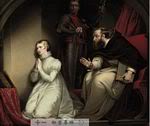
LADY JANE GREY.
THE health of Edward VI. of England had been failing many months, and his thoughts were turned toward his successor. Mary, his half-sister, was the rightful heir to the crown; but she was a fierce, cruel Catholic, and the young king feared, if she were to hold the scepter, persecution and misery would overspread the land. He resolved to transfer the crown to a more worthy head. His cousin, Lady Jane Grey, was wise and good.
She played upon several instruments, sang sweetly, and could write and speak in French, Latin, Italian, and Greek. She was a Protestant, and would make a much better queen than Mary; and he decided to exclude his half-sister from the throne, and made his will, giving his crown to his cousin Jane.
In a few days Edward died; and, after the funeral ceremonies were over, several court ladies and gentlemen went to Lady Jane to acquaint her with Edward's will, and to pay her homage as queen. She was much surprised, and could hardly speak. Then she grew pale and faint? The crown did not belong to her. She said it was Mary's by inheritance, and she did not wish to be made a queen instead of her.
"Shall I," she asked with spirit, "who would not steal a shilling, usurp a crown? Oh, if you love me, do not force me to that high station, so sure to be followed by a fearful fall."
The Duke of Northumberland, her husband's father, told her it was Edward's dying wish. Her parents commanded; and her loved husband, Lord Guilford Dudley, begged her to accept it.
At last she consented with reluctance, and was proclaimed queen.
Her reign was short.
The people admired and respected her; but Mary was the lawful heir to the crown, and they did not wish to see her cast aside. They felt it was a wrong to their loyalty, and soon began to look upon Lady Jane Grey as a usurper. Mary's cruel character was but little understood; and when she pressed her claims, the people rose to do her homage, and she was crowned in triumph.
When, these tidings reached Lady Jane, who had been queen only in name for nine days, she expressed no surprise or sorrow. "These words," she said mildly, "are more pleasant than those in which you bade me be a queen."
Soon, the dark, cruel side of Mary's character was seen. Almost her first act was to cause the arrest of the Northumberland family, and order the execution of the Duke.
Her eyes were then turned with revenge on Lord Guilford Dudley and his wife. Their property was seized; and they were sent to prison, followed by weeping people. Days and weeks passed.
Mary's course did not please her subjects. The strict confinement of Lord Guilford Dudley and Lady Jane excited anger and pity everywhere.
The murmurings faintly reached Queen Mary, and she feared the people might rise against her. She sent a message to Lord Guilford and his wife, bidding them be ready for an immediate death.
On the morning of their execution, February 15, 1554, Lord Guilford sent a request to his wife, asking to see her. She feared such a meeting would shake the courage of both and make death harder, and she refused.
"Such a meeting," she returned, "would only add to our affliction. It would disturb the peace with which we should arm our souls for dying.
Defer it for a short time, and we shall meet where unions are no more severed."
When she saw her husband pass on his way to the scaffold, she showed great emotion, and waved her hand to him, a silent farewell. Her own doom came soon after. Before she reached the place of execution, she met men carrying the lifeless body of Lord Guilford. She stopped and looked a moment upon him, sighed deeply, and walked on with a firm step, with her eyes fixed on her prayer book. She ascended the scaffold still wet with her husband's blood, and spoke to the people a few words.
Then, she knelt down, and prayed calmly, "Have mercy on me, O God, according to thy loving kindness; according to the multitude of thy tender mercies, blot out my transgressions."
The heart of the grim executioner was touched, and on his knees he asked her pardon. Lady Jane laid her head upon the block, closed her eyes, clasped her hands, and prayed, "O Lord, into thy hands I commend my spirit." The next moment, by one blow, her life was over. Lady Jane was seventeen years of age. History cannot find another more accomplished, pure, and beautiful; and her early death filled the nation with horror and mourning.
The Day Spring.